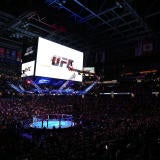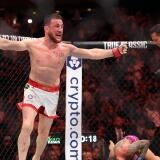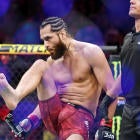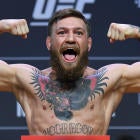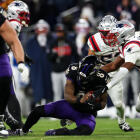Why it feels like UFC is stuck in a massive rut with its current state of matchmaking
The promotion is in the middle of a low period where main events are seemingly slapped together at the last minute
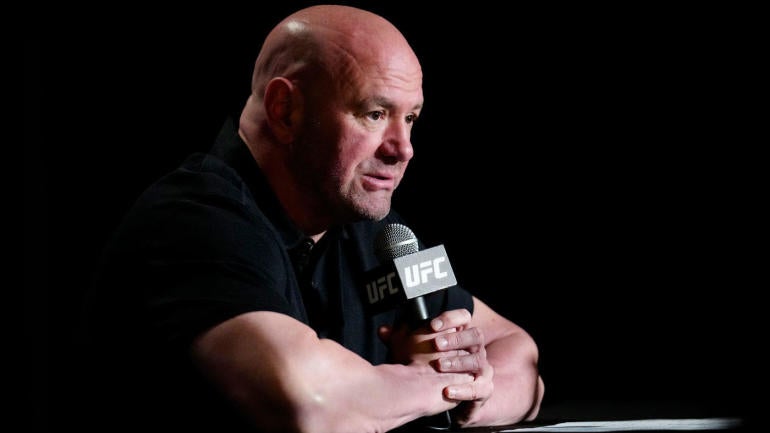
MMA fans are slogging through one of the weakest stretches of UFC events in recent history. The cards -- and main events in particular -- have been short on star power as the promotion continues to churn out events on a near-weekly basis. Fights are being plucked from one crippled card to another to patch up holes on short notice. It hurts the viewers and fighters all while UFC and parent company Endeavor continue to tout record profits.
"It just feels like UFC is in a season where they're trying to maximize profits -- which is business, that's what big businesses do -- but doing it in an almost shameless manner and at every single turn," CBS Sports analyst and "Morning Kombat" host Brian Campbell said on the Nov. 10 episode of the podcast. "I think across the board you're seeing a more watered-down product."
The reasons for UFC's dip in quality are simple, but the ramifications are complex. ESPN's 2019 acquisition of UFC's television rights was a boon for the promotion. The UFC was guaranteed $150 million per year so long as they met ESPN's event quota, plus additional income over a certain number of pay-per-view buys. Combat sports have traditionally been a volatile business where revenue relied heavily on fan interest. A big headliner equals big money. A lack of name value equates to a shortage of cash flow. The ESPN deal granted UFC guaranteed income, financial stability and less dependence on fighters to attract a mainstream audience.
The UFC generates 90% of all revenue in MMA and houses most of the sport's top talent, according to Bloody Elbow reporter John S. Nash who has extensively covered the UFC antitrust lawsuit. CBS Sports analyst Luke Thomas identifies their monopsony (where one firm is the sole purchaser of goods or services), as well as their revenue streams as prime motivators for the promotion's quantity over quality approach.
"I watched UFC have to compete to kill off the IFL. I watched them have to compete to kill off EliteXC and Affliction," Luke Thomas said on the same "Morning Kombat" episode. "I watched them compete on a certain level to win those battles and they did. They're just not competing, to me, anymore. The business is so large and entrenched and the methods of revenue generation are so fixed that nothing can challenge the market but the Ali Act or unionization."
Kai Kara-France and Amir Albazi -- two fighters who mainstream fans likely couldn't single out of a line -- headline the June 3 card. The same goes for Abus Magomedov and Mayra Bueno Silva, both of whom headline cards this summer. We are far removed from UFC title fights as televised main events of years past.
Questioning the name value of headliners is not a slight on the quality of their talent. It isn't even necessarily a criticism of their marketability as that would require the UFC to market them. The UFC is no longer incentivized to market superstars to the mainstream viewer. It would grant fighters negotiating leverage, after all. UFC's biggest and most lucrative customer is the mainstream fan. These are the crowds who get behind fighters and boost their profiles, leading to better paychecks and outside opportunities.
"Right now in this era, UFC does not have the financial motivation to make crossover stars," Campbell said. "What did they use to do 10 years ago? I'll tell you because I was working at ESPN at the time... If they had a surprise new champion, like when Chris Weidman beat Anderson Silva, they ran them into ESPN three times in a six-month span to try and get them on every show and do every interview. They were in the business of building up fighters.
"A lot of times now they are in the business of publicly negotiating against your favorite fighters and telling you why your favorite fighter isn't as talented or valuable... I don't think there is a great commitment right now to UFC promotional storytelling. I think there is a purposeful stiff-arming of, 'We don't want these guys to be superstars because then we need to pay them more. In fact, we're going to stomp on them publicly at every turn to show them who is boss.'"
Can't get enough boxing and MMA? Get the latest in the world of combat sports from two of the best in the business. Subscribe to Morning Kombat with Luke Thomas and Brian Campbell for the best analysis and in-depth news.
This isn't the first time the UFC product has felt stagnant. Fortunately for the company, the breakthrough success of global stars Conor McGregor and Ronda Rousey remedied growing pains and propelled the promotion to new heights around 2015/2016.
"This is the second time during my fan-slash-media life in MMA that I have seen a ton of complaints around oversaturation," Thomas said. "It happened around 2013 or 2014 previously. There were great concerns about where the product was going. The Fight Night cards were getting worse and worse... Ratings were declining in certain ways, anyway. PPV numbers had sort of come back to Earth. They had a lot of injuries at the time.
"Here we are again. Is something like that really possible? I have some concerns because of the way the business works. They have taken out the star power volatility."
The increasingly rare times that UFC backs fighters deserve scrutiny too. Take Colby Covington, for example. UFC president Dana White has remained steadfast that Covington will challenge for the UFC welterweight title despite other contenders having better meritocratic cases. Even champion Leon Edwards has brushed off Covington as a worthy challenger. A short-notice title eliminator between Belal Muhammad and Gilbert Burns at UFC 288 -- two fighters arguably more deserving of the title fight -- removed Burns as an immediate contender while likely keeping Muhammad queued behind Covington.
Covington's supporters will argue that he is a more marketable PPV headliner; however, that may be an overstated claim. His second fight with Kamaru Usman reportedly sold an impressive 700,000 worldwide, according to Sports Business Journal, but that deviates from the norm. The exact numbers for UFC 272 are not public knowledge, but we know it sold less than the 400,000 achieved by UFC 274, per Sports Business Journal. Furthermore, Covington's ESPN headliner against Robbie Lawler was the worst drawing of the first five ESPN cards, according to Forbes and MMA Fighting.
"What I believe is happening with the UFC is that their data understanding comes purely from volume," said data analyst Jason Leib, who has covered topics like the James Krause gambling scandal and the failed Jon Jones vs. Francis Ngannou fight extensively on his MMAI YouTube channel.
"The UFC is very keyed in on headlines instead of developing any sort of internal metric of interesting fighter performance compared to their marketability as a news figure, let's call them."
White proclaimed at a recent press conference that Power Slap was "number one in all of sports" in social media traffic, including NBA, NHL, NFL, Formula 1, WWE and more put together. UFC's skewed perception of social media engagement and how it translates to event viewership may be the crux of its overconfidence in both Covington and Power Slap.
"What Colby is very good at is controlling his own narrative," Leib said. "He has one controversial thing to say. He'll talk and he talks about things. But then invariably he'll say one thing that every person has to do their little reaction to. So it becomes this thing where he makes himself into a story and detracts from Gilbert, Belal, sort of like a black hole of interest... What is Colby's response? People are expecting it and all it does is just drives up views."
This shaky understanding of data may explain other matchmaking decisions. Former UFC bantamweight champion Holly Holm will headline the aforementioned Fight Night card with Bueno Silva, despite having a fighting style that is generally unpalatable to the casual fan.
"Holly Holm is famous because she knocked out Ronda Rousey and they just keep thinking that she has some sort of name-brand star power," Leib said. "But a lot of the issues I see are them not recognizing that fighting style is just as important as drawing names. In my opinion, what they do is say, 'She knocked out Ronda Rousey, it's one of the most viral moments in UFC history, so she's a bankable star.' In actuality, her fighting style is just not conducive to the casual fan."
There are only so many world titles to accommodate UFC's increased event schedule. One of the company's signature moves to promote a pay-per-view event is to attach a championship belt, through hell or high water. Interim titles are power slapped onto fights regardless of how available the reigning champion is. The caveat there is that interim champions are paid more so at least it benefits the fighters. White confirmed at a 2019 press conference that interim champs are entitled to the same benefits as undisputed champions, namely, a share of PPV revenue.
In a bizarre move to sell UFC 291, headlined by lightweight contenders Dustin Poirier and Justin Gaethje, White reintroduced the BMF title. This was a ceremonial title presented by Dwayne "The Rock" Johnson to the winner of Jorge Masvidal vs. Nate Diaz at UFC 244.
"Since Jorge Masvidal retired, the BMF title is back up for grabs," White said.
The problem is that White previously insisted that the ceremonial championship was a one-off for the Masvidal-Diaz fight. Plus, after Masvidal won the "title," he went on to lose his next four fights in succession. So he, in theory, doesn't even have a claim to the ceremonial title. It's all in good fun, but it's a rather lazy and uninspired coat of paint for a rematch of what many consider to be the 2018 Fight of the Year.
"It's a one-and-done," White said at a 2019 press conference. "Whoever wins, wins the belt and claims the title. 'BMF.'"
Fighters pay the price
UFC's matchmaking trend can have significant consequences for fighter health and performance. Muhammad was fasting for Ramadan when he agreed to fight Burns, the latter of whom was two weeks removed from fighting Masvidal. Mackenzie Dern vs. Angela Hill and Ricky Simon vs. Song Yadong are two recent undercard fights that were hastily pushed back to fill main events.
It appears that UFC recognizes these fights aren't main event worthy, yet they're churned out to maximize output. These abrupt changes have a cascading effect. Dern and Hill both told CBS Sports of the anxiety and mental toll of extending fight camps. For Song and Simon, it impacted the delicate and potentially dangerous weight-cutting process.
"The hard part is cutting weight," Song told CBS Sports. "I was almost done cutting weight, but they said you need one more week. That was hard for me. Everything was cut down. Training, conditioning, boxing, wrestling had all been cut down."
"When you get closer to the fight, you start tapering off of the harder workouts," Simon told CBS Sports. "You start fuelling your body only for what is really necessary depending on how much weight you need to lose. Adding that extra week means we had to add back in hard workouts when we were already tapering down. We had to bring the calories back up and get some more live workouts. Then bring it back down again. It was a bit of a fluctuation."
The UFC has shown a willingness to promote fights even before contracts are finalized if it behooves them to do so. The most recent example of this is White targeting, and later announcing, Aljamain Sterling vs. Sean O'Malley for the UFC bantamweight title on Aug. 19. Sterling will be three months removed from a defense against Henry Cejudo and is struggling with his post-fight weight.
"It's very frustrating," Sterling told MMA News. "I bloat so bad after making that kind of a drastic weight cut. My body just holds on to everything.
"I do want to be active, that's why I asked for September... I want to enjoy my summer a little bit more, and my birthday, so it is what it is. It's frustrating, but I know this is the job so I know we'll try to figure it out the best that we can."
The fight's announcement came as a complete surprise to Sterling's longtime striking coach, Ray Longo. Longo happened to be on the phone with CBS Sports conducting an interview for this feature when White formally announced the fight. Longo said he had no knowledge of Sterling committing to the fight.
"Who could possibly like that?" Longo said. "I don't think that's right. I don't like it if I don't know what else to say. I mean, either both contracts are signed or they have to say, 'We're working on this.' But to announce the fight, I think it's a way of putting pressure on the fighters and it makes them look bad if they don't fight and they never agreed to fight."
The UFC is a powerhouse corporation, there is no doubt. But their current business model and matchmaking philosophy are not conducive to the best experience for fans or fighters. The cards are gutted, the fighters must repeatedly compromise for opportunities and inspired storytelling has been replaced by a cookie-cutter, manufactured experience.
"They're not motivated anymore to make stars," Campbell said before adding, "There are two things that sell the fight game and always have: stars and storylines."


